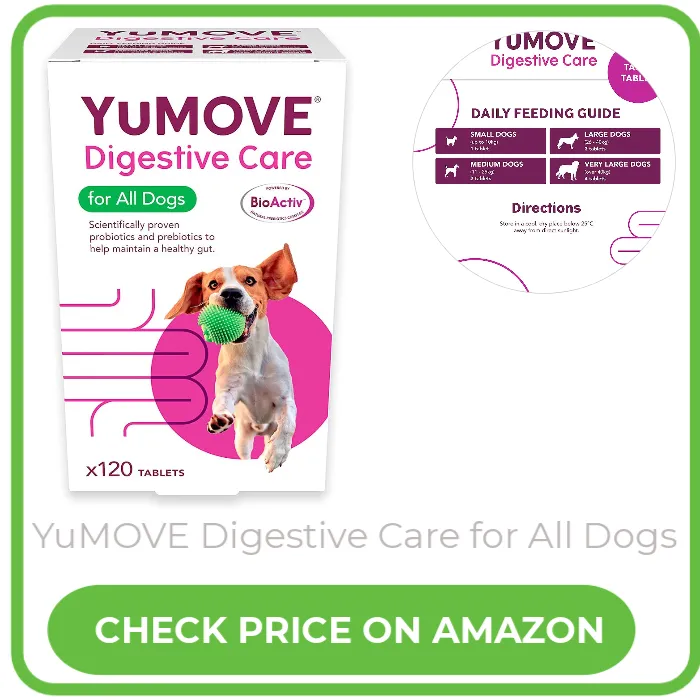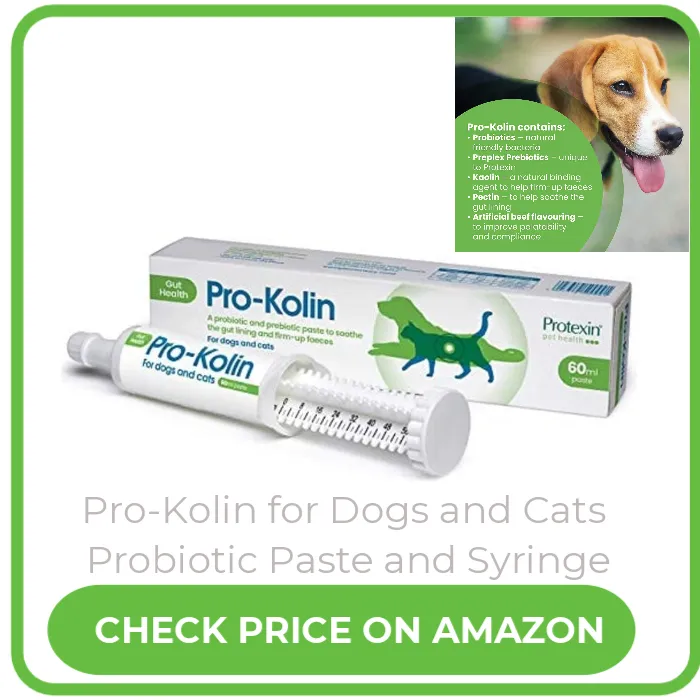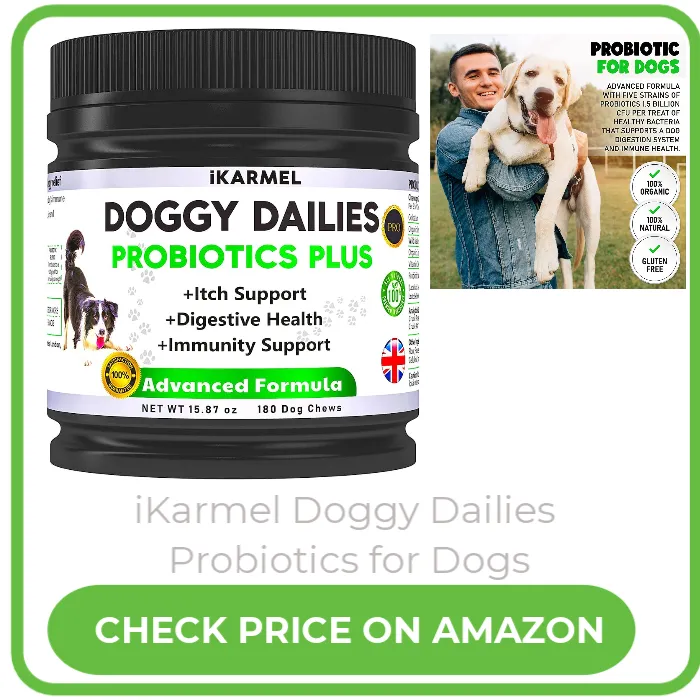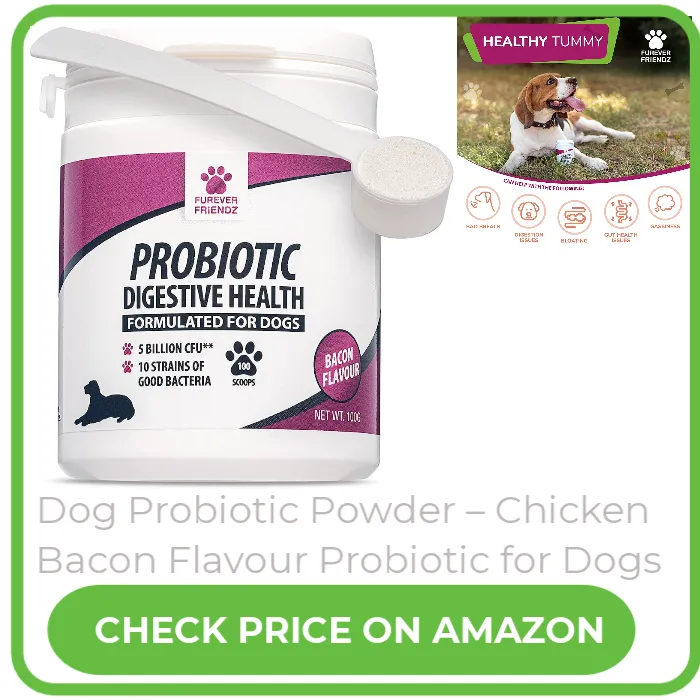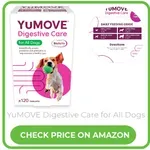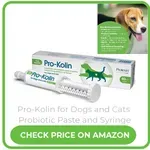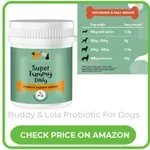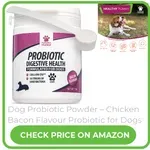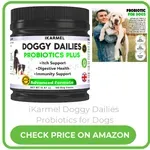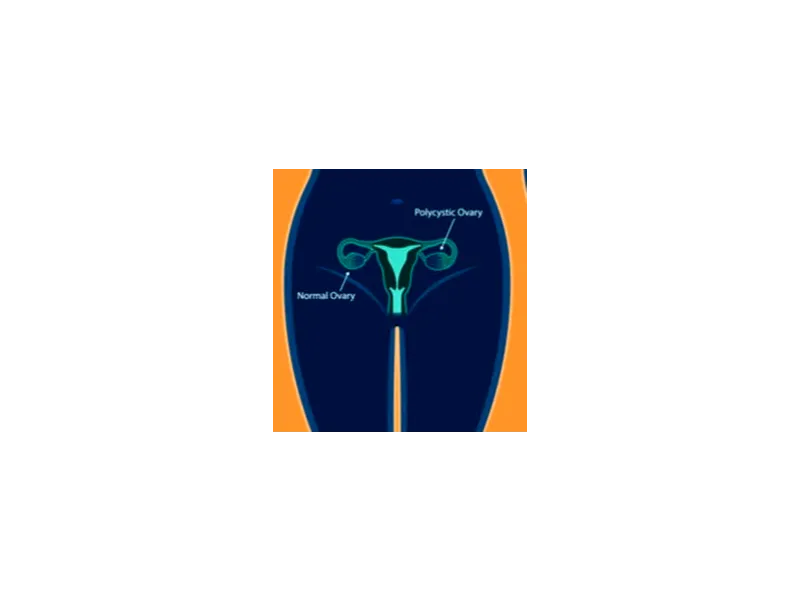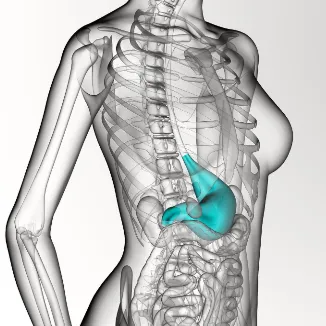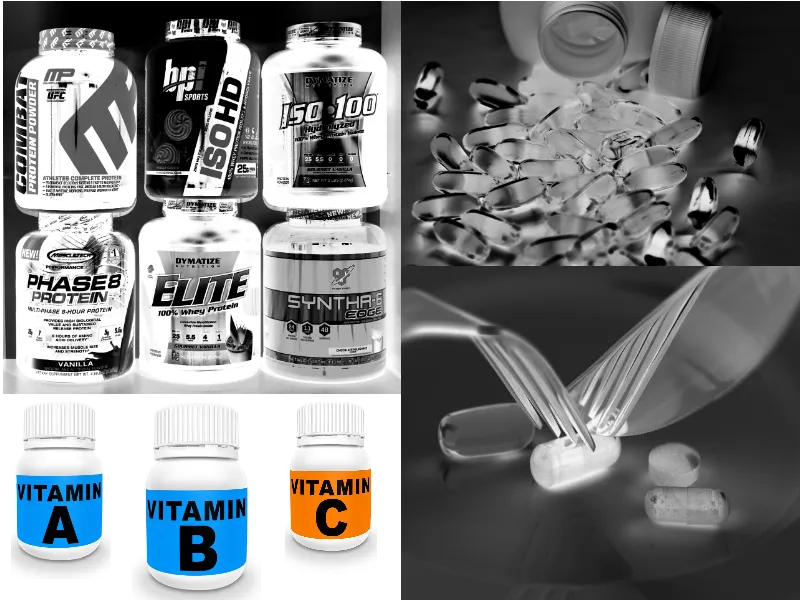Probiotics For Dogs
Probiotics are live microorganisms that may offer health benefits when consumed. They are available in supplements and many types of food, and may be beneficial for digestion, gastrointestinal health, and overall health. Prebiotics and probiotics can help dogs with digestive issues like diarrhea and bad breath, or help ensure that your dog maintain a healthy gut. A canine probiotic may be the best choice for dogs with sensitive stomachs, diarrhea, or general decline in health.
Probiotics are safe for dogs, but it is important to make sure you get the right one for your dog, as some strains may be toxic for dogs. Probiotics for dogs come in many forms and can be given to dogs with a variety of health needs. It is important to give your dog a probiotic specifically for dogs, as some supplements that are safe for humans may be toxic for dogs.
Probiotics may help promote the growth of good bacteria in a dog’s gut, and can help dogs with digestive and immune issues. A daily dose of probiotics may be beneficial for adult dogs, and probiotics made specifically for senior dogs are available. Probiotics may be helpful for dogs suffering from allergies, skin conditions, or even shelter dogs. Veterinary probiotics may also be an option, but it is important to discuss potential side effects with your veterinarian. Whether probiotics are right for your dog may depend on the individual, and it is important to ensure that your dog is getting the best one for their needs.
How to Find the Best Probiotic Supplement For Your Dog?
According to the American Holistic Veterinary Medical Association, 70 per cent of dogs are affected by yeast or Candida. They may develop a chronic skin conditions, and even kidney disease if left untreated.
Various dog breed can get intestinal problems when they eat meat or even poultry. This can lead to diarrhea, vomiting, or even death. So how can you protect your dog from these problems? Read this article to find out.
We’ve all heard about the health benefits of probiotics for human beings. But what about your dog?
If you’re looking to improve the health of your dog or cat, one of the most common ways is by using probiotics. Probiotics are live microorganisms (often called microorganisms) that have been shown to have a positive impact on our overall health and well-being. However, what about the effect of probiotics on dogs? Have you considered giving your canine companion some of these beneficial microorganisms?
Probiotics for dogs are extremely important when it comes to their health. They play a key role in the digestive system and the body's immune system. Probiotics are a natural form of bacteria found in foods such as milk, yogurt, cheese, kefir and miso. Most of us are familiar with probiotics when it comes to eating probiotic-rich foods. Unfortunately, we don't always think about the benefits of probiotics when it comes to our beloved pets.
Can’t decide whether your dog needs a probiotic supplement? Or maybe you’re just curious about which probiotic product is best for dogs? This is the place to get the scoop. Learn about the benefits of probiotics for dogs and how to choose the best product for your canine companion.
Probiotic is a micro-organism that is found in healthy animals and humans. In some cases, it may be found in animals suffering from diarrhea, digestive issues, and intestinal inflammation. According to a study published by the Journal of Dairy Science in 2017, probiotic supplements may be used to support the immune system and help reduce antibiotic resistance in dogs.
Probiotics for dogs is a hot topic these days because it works! In this article, we're going to look at the scientific evidence and the clinical benefits of adding probiotic supplements to your dog's diet.
The number one way that dogs get sick is from eating things that are bad for them! Here's how to use a probiotic to help keep your dog happy and healthy!
These Top 5 make our Top Selection List:
How we choose:
We've read through & researched countless reviews on Amazon and other Authoritative Sources and Researched Data to find some of the best of the best Probiotics For Dogs supplements for immune support, muscle strength, muscle recovery, athletic endurance and sleep.
Why YuMOVE Digestive Care for All Dogs
Made Our Best of The Best Top 5 & Why we love it
It is helpful & reassuring to know
YuMOMOVE, helps over 1.7 million dogs globally every year.
Why Pro-Kolin for dogs and cats
Made Our Best of The Best Top 5 & Why we love it
It is helpful & reassuring to know
Pro-Kolin for your cat or dog is a powerful gut health supplement that contains probiotics and prebiotics, along with other high-quality ingredients, including our unique Preplex prebiotic. It's easy to administer and palatable for your pet, so you can enjoy a healthier, happier life.
Why iKarmel Doggy Dailies Probiotics for Dogs
Made Our Best of The Best Top 5 & Why we love it
Doggy Dailies offer 3-in-1 support in just one supplement. Formulated with organic ingredients, they support the immune system and help your dog digest. A more effective alternative to itch aid dog wash, their supplements contain colostrum, organicTurmeric, and salmon fish oil.
It is helpful & reassuring to know
Why Furever Friendz Pet Supplies Dog Probiotic Powder
Made Our Best of The Best Top 5 & Why we love it
It is helpful & reassuring to know
Why Buddy & Lola Probiotic For Dogs
Made Our Best of The Best Top 5 & Why we love it
It is helpful & reassuring to know
Knowledge Base
# Probiotic
# Probiotic for Dogs
# Dog Probiotic
# Best Probiotic for Dogs
# Best Probiotic
# Diarrhea
# Digestive
# Best Dog
# Yeast
# Best Dog Probiotic
# Digestive Health
# Dogs with Diarrhea
Probiotic
Probiotic for Dogs
Dog Probiotic
Digestive
Best Probiotic
Prebiotic
Best Probiotic for Dogs
Human Probiotic
Probiotic Supplement
Digestive Health
Types of Probiotics
Types of Probiotics for Dogs
Need Probiotics
Probiotics Used
Strain
Digestion
Give Your Dog
Best Dog
Benefits of Probiotics
Best Dog Probiotic
Give Your Dog Probiotics
Beneficial Bacteria
Take Probiotics
Probiotics Work
Nutritional Supplement
Canine Probiotic
Choice for Dogs
How to Select the Right Probiotic for Your Dog
When choosing probiotics, it is important to choose a good quality probiotic that provides the appropriate levels of probiotic organisms and enzymes. The bacteria used in probiotic products must contain high counts of specific strains of beneficial bacteria. These beneficial bacteria assist in the maintenance of a healthy immune system, digestive tract, and other areas of the body.
In order to find the right probiotic for your dog, you have to consider a few things. You need to consider whether you want to treat your dog or simply give him some bacteria. Once you’ve decided that, the next step is to make sure that the probiotic you choose will really work.
There are a lot of different strains of probiotics available, but they all share two things in common: they contain probiotic bacteria that have been tested and approved by the Food and Drug Administration, and they contain a specific amount of probiotic bacteria.
There are many types of probiotic products on the market. Most are manufactured using live cultures that have been genetically engineered to contain high levels of bacteria. These cultures are then grown in an environment that contains an abundance of beneficial bacteria. They are then extracted and formulated into an appropriate dosage form, which is either liquid or capsule.
It is really easy to find probiotics on the market. There are so many companies that sell them, and there are so many different brands. But there are many things you have to think about before you buy them. First, you should read the label carefully to see what is actually in the product.
You should be looking for an active culture of probiotic bacteria. Some products contain dead bacteria or inactive bacteria. Also, you should make sure that you are buying the correct amount of probiotics. This is the only way that the bacteria will be effective. If you use too little, the bacteria will not do anything for you. If you use too much, you may end up with a gastrointestinal infection.
How to Administer Probiotics for your Dog
After all, the best way to make sure you’re giving your dog the right kind of probiotics is to give them a probiotic supplement. This will ensure that you're feeding them the right bacteria to help keep their digestive system healthy.
If your dog has trouble eating, gets diarrhea, or suffers from a skin problem, this is likely to be the result of a bacterial imbalance in the gut. So, the best thing to do is to feed them a probiotic supplement that includes a broad-spectrum probiotic to restore the good bacteria in the gut.
You need to feed them a diet full of probiotics, since they're natural immune system boosters. Probiotics are the most natural type of dietary supplement available, and they help support overall gastrointestinal health.
Feeding a dog probiotics helps boost its immune system and keeps it healthy, plus it helps keep the gut bacteria healthy too.
So if you're interested in giving your dog probiotics, the first thing you should know is that it's pretty easy to do. All you need to do is administer a probiotic supplement orally (in food or treat form).
It's easy to feed your dog probiotics. You can buy the supplements at most pet stores. Some dogs are more sensitive than others, so you may want to try some before you commit to giving your dog probiotics on a regular basis. You can feed the supplements to your dog once a day or twice a day.
You will find that many supplements are available for sale at most pet stores. They come in liquid form and in dry form. The supplements you use should be natural, and not synthetic. Natural supplements usually contain a variety of natural ingredients such as fruits, vegetables, herbs, oils, and so forth. These supplements are much healthier for your dog than artificial or chemically made supplements.
How to Choose the Right Type of Probiotic for Your Dog
In the case of dogs, probiotics are meant to prevent diarrhea, not treat it. Probiotics are good bacteria that help regulate the gastrointestinal tract and protect it from toxins and pathogens.
However, there are different types of probiotics that will affect the way your dog behaves. In fact, certain probiotic supplements can cause anxiety and aggression in dogs. So, it is crucial to choose the right type of probiotic supplement for your dog.
Because your dog’s digestive system is unique to them, probiotic supplements for dogs must be tailored specifically for the size, lifestyle, and age of the pet. The amount and type of probiotic strain (and how much of that strain) are determined by the number of probiotics needed to meet the needs of your dog.
There are many strains of probiotics for dogs, but the ones commonly used by veterinarians tend to have certain attributes, such as being freeze-dried, resistant to stomach acids, and easy to administer
.
The probiotic supplement that your dog is taking needs to be carefully chosen. Some companies sell cheap products that aren't effective at all. Others have supplements that are made with a high percentage of certain probiotics that can cause problems.
Always check the ingredients and make sure that the product has been tested before you use it. There are some foods that can be used instead of giving your dog probiotic supplements. You can feed your dog yogurt, eggs, kibble, and more.
After the manufacturer gives you a brief explanation of the ingredients, you’ll need to consider how the probiotic is going to affect your dog. The three most common types of probiotics for dogs are encapsulated, liquid, and chewable. Each one is suitable for a different type of dog.
Probiotics. Though they don’t have a direct influence on your dog’s health, they can be important to help your furry friend achieve a healthy weight. You can choose from a range of supplements, including pills, liquids, and powders. Your vet can help you determine the best option for your dog.
We've mentioned that some probiotics are better than others. If you are taking probiotics for your dog, make sure that you only buy products that are made from reputable brands. Some companies make cheap products that are harmful to your dog's health. Make sure that the manufacturer doesn't use fillers or additives that might cause harm to your dog's health.
There are different kinds of probiotic supplements that are safe for dogs to use. Some of them are better than others. You need to find a supplement that your dog will tolerate well. You should read the package carefully before buying it. You must also check the ingredients of the supplement. In particular, check the source of the bacteria.
How to Choose the Right Amount of Probiotic for Your Dog
There are a lot of probiotics out there on the market. Choosing the right amount of probiotics for your dog can be a tricky business. It requires careful consideration and research, so you’ll want to spend some time on this.
There are several ways to determine how much probiotics your dog needs. One way is to ask a veterinarian for help. Another way is to take the information found in this article and use it as a guide.
The amount of probiotics used in a dog food depends on the size of the dog. Small dogs require 1-2 grams per day, medium dogs 2-3 grams, and large dogs 3-4 grams.
Probiotics are beneficial for dogs because they contain Lactobacillus. This bacteria is important to the immune system because it prevents harmful bacteria from growing. This bacteria is also helpful for digestion because it contains enzymes that break down food into smaller pieces.
The probiotics in dog foods usually come from milk. However, some companies use probiotics made from fermented dairy products or vegetable oils.
If you feed your dog probiotics, you will see improvements in the health of his skin and coat. You might even notice an improvement in the quality of his stool.
Once you have decided how much probiotics you want to give your dog, you need to find a probiotic product that has high quality ingredients. Make sure that your dog gets only one type of probiotics. You don't want to feed them too much.
If you don't find any products that you like for your dog, you can make a homemade probiotic supplement yourself. To make it, all you need to do is add one teaspoon of probiotics per eight pounds of food given to your dog. Some good probiotic supplements for dogs include: • VivaBiotics for Dogs: This supplement contains both human-grade and canine-grade probiotics, which is important because not all probiotics are created equal.
How to Store Probiotics for Your Dog
When it comes to storing probiotics for dogs, you have to take a lot of factors into account when choosing the container or bowl you should purchase. Many pet owners are concerned about the shelf life of probiotic supplements and whether or not they are safe for their pets.
For example, some people prefer to keep their supplements in glass containers to ensure that they remain fresh. Others prefer plastic because they believe that it doesn't leach potentially harmful chemicals into their food and water.
To avoid problems with the shelf life of your probiotics, you should store them in a refrigerator. Keep them away from heat and sunlight and try to store them in a cool place. A container with a lid is best for your probiotics.
These containers are easy to carry around and they can be used easily. You should not put your supplements in an airtight jar, as it can make them mouldy. Make sure that the container is large enough so that you can comfortably feed your dog or cat.
You need to decide what size bowl or container you want to buy. You don't want a huge container or one that has too much room. Instead, choose a smaller container that will hold all of the probiotic supplements you need.
Choose one that is light and won't weigh down your dog. A good choice would be a glass or ceramic container. These containers are durable and will last longer than plastic containers. You can place your probiotic supplement in a glass or ceramic bowl, and you'll be able to use it for a long time.
The health benefits of probiotics for dogs are not in dispute; however, storing them correctly can be a bit confusing. In this post, I’ll walk you through how to store dog probiotics and what the storage container options are, so you can choose the right one for you.
How to Know if your Dog Is Using Probiotics Correctly
What kind of probiotics is your dog getting? Probiotics are microorganisms that benefit our health in a number of ways. They help digestion and provide immunity. There are several types of probiotics, including bifidobacteria, lactobacilli, streptococcus, and yeasts. These organisms can be found in the digestive tract of many animals, including dogs.
Probiotics are not always the same thing as prebiotics, but they do both have a positive effect on the gastrointestinal tract. Prebiotics, such as inulin, are carbohydrates that are used by probiotic bacteria to produce beneficial substances. A healthy digestive system is essential for the health of your dog.
It is important to give your dog the best nutrition possible. By supplementing with probiotics and prebiotics, you are providing your dog with all the vitamins, minerals, antioxidants, and enzymes it needs. Probiotics and prebiotics are becoming more popular in canine nutrition, but there is still much to learn about them. There are many different types of probiotics and prebiotics, and they can be mixed together.
The science behind probiotic supplements for dogs
There is a great deal of scientific research on the benefits of probiotics for dogs, and the majority of this research supports the use of probiotics as a supplement to improve the health of your dog.
There are a number of probiotics that are specifically designed to improve the health of dogs, and these probiotics have been shown to have a number of benefits for your dog. These benefits include reducing the risk of allergies, improving the health of the gut and immune system, and helping to maintain a healthy weight.
Science is cool, but it can also be difficult. The probiotic supplement market for pets is huge, and its popularity is due largely to the fact that pet owners are seeking to address the problems associated with our modern world.
According to the World Health Organization, “Probiotics have been recognized as a therapeutic tool in the management of diseases such as diarrhea, respiratory infections, and atopic dermatitis.” In fact, there are over 100 clinical studies on the topic.
So, what are probiotics? Probiotics are live bacteria that help your gut digest food properly and work to prevent disease. It's been known for years that certain types of live bacteria in the digestive system of mammals, including humans, can promote good health. However, the science surrounding probiotics isn't quite as settled as we'd like to believe. There are some studies that point to probiotics being beneficial, but others that seem to suggest it may do more harm than good.
The truth is, there's a lot of uncertainty surrounding the subject. Many scientists who study probiotics don't even believe they work, despite the fact that many people swear by them.
The reality is, there isn't really any conclusive evidence of whether or not probiotics actually do anything positive for humans, let alone animals. But, you can certainly try them out! Probiotic supplements are available in a number of forms, including pills, capsules, liquid, and food products.
Probiotic supplements are natural alternatives to antibiotics in treating and preventing digestive disorders. They are beneficial to both human and animal health. These beneficial bacteria in the gut help to produce healthy microflora, or the balance of beneficial bacteria in the gut.
These beneficial bacteria also produce hormones that regulate immune function. Probiotics are very useful in cases where the dog’s digestive system is compromised, such as when the dog has been exposed to toxins in food or when the diet is low in fiber.
Which probiotic supplement should you use for your dog's health?
The microbiome is the term used for all bacteria that lives in and on our bodies. The microbiome is a community of bacteria living in the digestive tract, skin, and even other parts of the body such as the mouth, respiratory system, and urinary tract.
In dogs, this means that the intestinal microbiome, the ecosystem of microorganisms living in the digestive tract, plays a critical role in maintaining both physical and mental health. When we consider this relationship, it becomes clear that the health of our dogs depends on the health of our dogs' intestinal flora.
So if you're still wondering which probiotic supplement to choose for your dog, or for the next time he or she gets sick, there are some things to consider. Probiotics, or "good" bacteria, work by encouraging the growth of the good bacteria already naturally living in your dog's intestines.
The probiotics you purchase should contain the "good" bacteria your dog needs to help strengthen his immune system, but they shouldn't contain anything your dog doesn't need. You can get your dog probiotics by supplementing his food.
When should you use a probiotic supplement?
Probiotics are the good bacteria found naturally in foods like yogurt, kefir, sauerkraut, kimchi, tempeh, and miso. Many scientists believe that a lack of these bacteria can contribute to the onset of diseases such as cancer, heart disease, diabetes, arthritis, and other serious illnesses.
While probiotics are marketed to humans, they have been used successfully in dogs for a long time. In fact, studies have found that dogs with a high level of probiotics are healthier, have fewer skin allergies, and are less prone to cancer than their counterparts without it. There are many online resources for finding probiotic supplements for dogs, but you should also consider asking your veterinarian or vet nurse.
A probiotic supplement may be the best way to boost the digestive system of your dog. This is especially true if your dog has been suffering from chronic diarrhea. Many dogs who suffer from gastrointestinal problems (diarrhea) are not willing to eat certain foods, such as meat, or do not absorb the nutrients they consume properly.
Some of the most common causes of intestinal problems in dogs include: food allergies, food sensitivity, intestinal parasites, irritable bowel syndrome, bacterial infections, and even some medications, like antibiotics.
There are so many ways to boost a pet’s immune system and fight off diseases, including probiotics, and there are probiotic supplements that will do the trick for your dog. But before you start using a probiotic supplement for your pooch, there are a few questions you should ask yourself before jumping into the supplement world: What is your dog’s weight? How old is he or she? Do you have an established diet regime? And most importantly, how do you feel about probiotics?
We all know that dogs are very sensitive to changes in their environment. This makes it easy to see how a change in diet can impact their overall well-being. Dogs are also prone to illness due to stress, environmental factors, and genetic predisposition. A probiotic supplement is designed to help with gut flora. This can be useful to prevent intestinal upset or provide support after a food or water allergy.
There are many reasons to consider a probiotic supplement for your dog. They have the added benefit of helping to build the microbiome, which is something we all know dogs are lacking in.
This can help prevent diarrhea, digestive upset, skin problems, and various allergies. While the vast majority of pet owners are comfortable giving their dogs food that they eat themselves, giving your dog probiotics is another matter. You’ll want to make sure that you are feeding your dog the right probiotic supplements to ensure that it is as healthy as possible.
Where can you find a trusted source for probiotic supplements for dogs?
As soon as you take care of your dog, you may want to give him some probiotics. In fact, you should start taking care of your pet as soon as you get them because they need to eat food that’s healthy for their bodies. So, where can you find a reliable source of probiotic supplements for dogs?
There are a number of places. You can find supplements on Amazon, at pet stores, and even online. There are a number of different types of probiotic supplements for dogs available. Some are for humans, but some are formulated specifically for pets. You can also find a few probiotic supplements on Amazon.com.
If you're looking for a trusted source for probiotic supplements for dogs, you can find a plethora of options at a wide range of price points. There are even a few online retailers that provide free shipping on orders of $75 or more, so finding the perfect probiotic supplement is easy. Be sure to look for brands that contain only human-grade ingredients and have a reputation for providing the highest-quality probiotic products for humans and animals alike. Some popular brands include Piddle Power, Booda, and Biokult.
What to take into consideration when Finding the Best Probiotic Supplement For Your Dog?
- Take a look at what you're currently giving your dog.
- Look for a supplement that contains high levels of probiotics and prebiotics (probiotic foods are listed here).
- Read reviews of the brand or ask questions of your vet about the specific supplement you are considering.
- Know your dog's breed.
- Know your dog's health history.
- Know what foods your dog already eats.
- Know which brands of probiotic supplements you can get.
- Look for the label "source of live culture."
- Look for a supplement with a low sugar content.
- Choose a product with at least 3 billion CFU's of probiotics. CFU stands for Colony forming units, which are the number of alive and active microorganisms in a single serving of a supplement.
- Choose a product with live culture, not killed bacteria.
- Choose a product containing lactobacillus acidophilus, Bifidobacterium lactis, and/or Bifidobacterium bifidum.
- Choose a supplement made in the United States, UK, or Canada.
- Choose a product with no added sugar, flavors, or preservatives.
Conclusion
In conclusion, the number one thing to look for in a probiotic supplement is that it should be designed to specifically benefit your dog’s microbiome. This means that the bacteria should be able to survive in the stomach and gut so that they can continue to thrive when it reaches the large intestine.
When you look at the label, there should be an indication of the concentration of each bacteria, as well as a listing of which specific symptoms your dog is experiencing.
For probiotics to work, they must be taken on a regular basis. One of the best things you can do for your dog is to give them a probiotic supplement. Probiotics help your dog maintain healthy digestion and immunity. Some of the best brands of probiotics are Nature’s Variety, Bluebonnet, and New Naturals.
They are all great choices, but there are many others. In order to find the right supplement for your dog, you need to know a few things. First, what exactly is a probiotic supplement? Second, what types are there and how do you choose the best one for your dog? Third, what are the side effects? Finally, how much does each supplement cost? To help you make your decision, here is everything you need to know about probiotics and the best probiotic supplements for dogs.
How to find the best probiotics for your dog? Read on to learn how to find out the top five most effective brands available today.
We hope you found this information helpful and that it will help you get the results that you sincerely seek. All you have to do now is just press the BUTTON BELOW to check the price on the best option for you , do that now.
Thank’s for stopping by. Don’t forget to Book Mark us, to easily find us again. We hope to see you soon.

